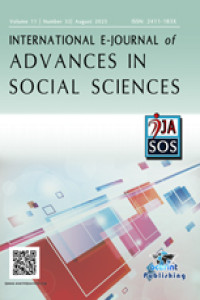SEHAT SAHULAT PROGRAM AND ITS EFFECTS ON HEALTHCARE UTILIZATION PATTERNS IN KHYBER PAKHTUNKHWA, PAKISTAN
Abstract
In 2015, the Khyber Pakhtunkhwa government introduced the Sehat Sahulat Program (SSP), a publicly sponsored health insurance scheme aiming at reducing out-of-pocket medical expenses of the public. Despite the program's implementation in both the public and private sectors, some previous studies indicate a higher utilization of private hospitals services compared to public hospitals under SSP. This paper examines the key factors that influence patients' preferences for private healthcare under SSP in Khyber Pakhtunkhwa, focusing on the quality of services provided by both the private and public sectors. Data was obtained using quantitative questionnaires on the key variables such as patient load, quality care, resource availability, personalized care, and supervision, influencing healthcare utilization decisions. This study's theoretical approach comprises the Theory of Planned Behavior, Rational Choice Theory, and Social Cognitive Theory. Patients' decisions were found to be primarily influenced by perceptions of better quality of care, higher resource availability, and more personalized treatment in private hospitals. The study provides evidence-based insights into healthcare utilization trends, emphasizing the need for strategic reforms in public sector healthcare services to provide fair access and make the best use of public funds. Finally, this study contributes to a better knowledge of healthcare dynamics in Khyber Pakhtunkhwa, as well as to the larger discussion on healthcare policy and management in Pakistan.
Keywords
Healthcare Sehat Sahulat Program (SSP) Healthcare Utilization Patterns Quality of Care Public and Private Hospitals Public Healthcare Private Healthcare Sehat Card Plus
Ethical Statement
This paper is a research paper/product of a research project (NRPU-17555) of the HEC Pakistan.
Supporting Institution
Higher Education Commission of Pakistan, Health Department of Khyber Pakhtunkhwa, Sehat Sahulat Program of Khyber Pakhtunkhwa
Thanks
Thanks to HEC Pakistan and thanks to Socioint 2025 Conference Management for providing the opportunity to present it.
References
- Ahmad, F., Rahman, H., Rahman, W. (2024) Sehat Sahulat Program of KP and its Impact on Medical Practitioners' Professional Life. Journal of Management & Social Science, 01 (04), 139-155. https://doi.org/10.63075/jmss.v1i4.42
- Ahmed, F., & Nisar, N. (2010). Public-Private Partnership Scenario in the Health Care System of Pakistan, Eastern Mediterranean Health Journal, 16(08), 910–912. https://doi.org/10.26719/2010.16.8.910
- Ajzen, lcek. (1991). The theory of planned behavior. Organizational Behavior and Human Decision Processes, 50(2), 179–211.
- Akram, M., & Khan, F. J. (2017). Health Care Services and Government Spending in Pakistan.
- Bandura, A., & Walters, R. H. (1977). Social learning theory: Prentice-hall Englewood cliffs, NJ.
- Becker, G. S. (1976). The Economic Approach to Human Behavior (Vol. 803), University of Chicago press. https://books.google.com/books?hl=en&lr=&id=qQAZnc-
- Burns, T., & Roszkowska, E. (2016). Rational Choice Theory: Toward a Psychological, Social, and Material Contextualization of Human Choice Behavior. Theoretical Economics Letters, 06(02), 195–207. https://doi.org/10.4236/tel.2016.62022
- Conner, M. (Ed.). (2009). Predicting Health Behavior: Research and Practice with Social Cognition Models (2. ed., repr). Open Univ. Press.
- Godin, G., & Kok, G. (1996). The Theory of Planned Behavior: A Review of its Applications to Health-Related Behaviors. American Journal of Health Promotion, 11(2), 87–98. https://doi.org/10.4278/0890-1171-11.2.87
- Hussaini, A. (2023). Third Party Evaluation of the Sehat Card Plus Khyber Pakhtunkhwa (p. 144).
- Khan, S. A., Cresswell, K., & Sheikh, A. (2023). The notion of access to health care in a large-scale social health protection initiative: a case study of ‘Sehat Sahulat Programme’at Khyber Pakhtunkhwa, Pakistan. Journal of Global Health Reports, 7, e2023024.
- Khattak, A. F., Rahman, A. U., Khattak, M., Qazi, M., Gilani, H., & Khan, A. (2023). Toward Sustainable Healthcare Systems: A Low and Middle-Income Country’s Case for Investing in Healthcare Reforms. Cureus. https://doi.org/10.7759/cureus.39345
- Naseer, M., Zahidie, A., & Shaikh, B. T. (2012). Determinants of patient's satisfaction with health care system in Pakistan: a critical review. Pakistan Journal of Public Health, 2(2), 52.
- Sairmaly, F. A. (2023). Human capital development and economic growth: A literature review on information technology investment, education, skills, and productive labour. Jurnal Minfo Polgan, 12(1), 679-693.
- Smith, A. (2002). An Inquiry into the Nature and Causes of the Wealth of Nations. 6–17
Details
| Primary Language | English |
|---|---|
| Subjects | Applied Sociology, Program Evaluation and Social Impact Assessment |
| Journal Section | Research Article |
| Authors | |
| Early Pub Date | August 7, 2025 |
| Publication Date | August 30, 2025 |
| Submission Date | July 11, 2025 |
| Acceptance Date | August 3, 2025 |
| Published in Issue | Year 2025 Volume: 11 Issue: 32 |
Contact: ijasosjournal@hotmail.com
The IJASOS Journal's site and its metadata are licensed under CC BY
Published and Sponsored by OCERINT International © 2015- 2025

